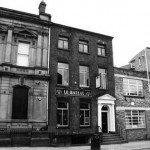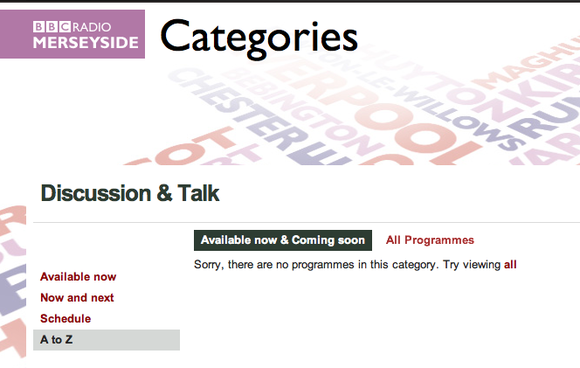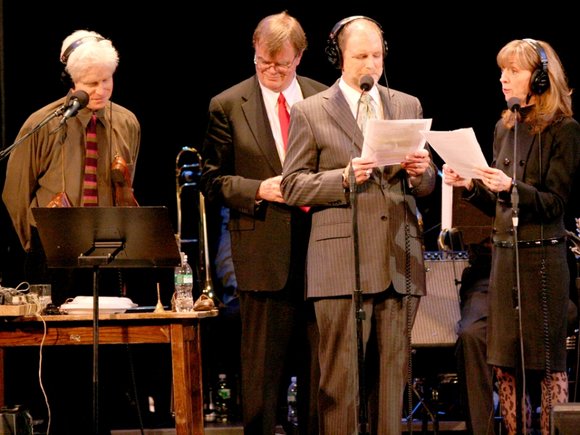Why Don’t We Listen To Local Radio?
Firstly a caveat. I know how popular Radio Merseyside is, and the good things it does. And I know how many awards Juice FM has won. I know that my Dad would be lost without Sean Styles and the footie beaming out from Merseyside’s Liverpool ONE HQ.
And still I wonder - why don’t I listen to local radio?
Yes, Dave Monks offers me a weekly lesson in the bands I need to follow, and Roger Hill’s eclecticism is a thing of beauty.
But I look at my podcast list and an inconvenient truth emerges: local radio doesn’t speak my language.
I listen to Roger Phillips sometimes and it’s not good for my heart. Here is an intelligent man - a man with a passion for the city, and (as evinced from his appearance at Bido Lito’s culture forum) a man we need to listen to. And yet there he is, sweet-talking to lonely pensioners from Norris Green, reminiscing about corporal punishment - a poster boy for the BBC’s hamfisted mandate delivery in the provinces.
You want real discussion? Sorry, no programmes match your search.
“Lively chat on local issues…empowering communities…giving us all a voice…” it’s as if Lord Reith never left the building.
Does local radio have to be so safe? So by-numbers? Is the BBC so constrained by licence fee hoop-jumping that it can’t find more space to develop new programming that would encourage the untapped demographic (that’s, er, us) into its embrace?
 Over in the US, the government subsidizes a string of non-profit local radio stations under the ‘public radio’ umbrella - many run by universities. Spread throughout the country, these networks produce blindingly brilliant shows such as ‘Radio Lab’ ‘This American Life’, KCRW’s Morning Becomes Eclectic (the best music radio show, like, anywhere), and ‘A Prairie Home Companion’ (pic) - that they’re produced as far afield as Minnesota, Chicago, Los Angeles and Santa Monica lends each of them a distinct and refreshing voice. No capital-centric scheduling for our US cousins.
Over in the US, the government subsidizes a string of non-profit local radio stations under the ‘public radio’ umbrella - many run by universities. Spread throughout the country, these networks produce blindingly brilliant shows such as ‘Radio Lab’ ‘This American Life’, KCRW’s Morning Becomes Eclectic (the best music radio show, like, anywhere), and ‘A Prairie Home Companion’ (pic) - that they’re produced as far afield as Minnesota, Chicago, Los Angeles and Santa Monica lends each of them a distinct and refreshing voice. No capital-centric scheduling for our US cousins.
The sublime design-based show, 99% Invisible, is a project borne from San Francisco’s relatively small station KALW (pic), and has now been picked up across the country - and is a massive iTunes podcast hit (and SevenStreets fave.)
These local public radio stations compete to sell on their programmes to larger, nationwide networks such as American Public Media, or its slightly better known competitor, NPR. That, and donations, is how they make their money.
The result? Programme-makers get off their arses and create genuinely must-listen content. Cultural memes that sweep the globe and, in their own way, proudly promote their hometown. Liverpool, given the opportunity, could create world beating radio.
Radio Lab (main pic), a product of New York based WNYC, single-handedly changed the sound of radio, with its thrilling cut-and-paste aural soundscape, its intelligent celebration of popular-science and its democratic presentation style.
It’s fun. It’s educational. It’s massively successful. And it’s produced by a local radio station.
Rick Vaughn it is not. Libby Purves’ Midweek it is not. Over there, radio has discovered that there is a third way - and it’s making a real impact, far beyond its geographical remit.
Here? We have the chattering classes in control of BBC Radio 4, the Radio 1 presenters’ graveyard (aka Radio 2) dominating the national airwaves, and a network of local stations permitted to do no more than navel-gaze their way into certain oblivion.
Sure, local radio stations should mostly keep it local (and even WNYC has its fair share of Phillips-style phone ins) but they should mix it up a bit, surely? Not every strand has to be a box-ticking exercise, should it? And even if it did, who’s filling the box marked ‘me’? Or ‘my mates’?
Liverpool is changing. We’re a curious, intelligent, contradictory, and engaged city. So where’s the shift in style at St John’s Beacon, or Hanover Street? Where are the programmes bedding in now for when the old-guard finally hang up their phones?
I’m from Liverpool. And I like folk music. So I should like Radio Merseyside’s Folkscene (the longest running folk radio show, folks).
Yesterday it played some self-indulgent, spirit-sapping a-capella dirge by a bloke with, ooh, all of three notes to his repertoire. It was so bloodless I forced myself to go out and water my Dad’s tomato plants (of course I was at my parents. I don’t tune it at home do I?)
After four refills of the watering can, I came back inside and he was still blooody singing. My mum was initiating divorce proceedings, and the budgie had hung itself from its millet spray.
This was a sunny Sunday afternoon. It sounded like we were in a funeral parlour. For the love of god, could they not have stuck some Bellowhead on?
Even my Dad turned off. We were witnessing the sound of ever decreasing circles. And it summed up everything you need to know about the state we’re in.
BBC’s local radio is in disarray - budgets slashed, good people lost. The team at Merseyside does a lot, a hell of a lot, on very little. And its broader editorial policy is ruthlessly centralised. But, while much can be said for the BBC’s commitment to quality, it’s squeezing the lifeblood out of local radio, and is forcing a major subset of its audience to go forage for content 5,000 miles from home. Content that, honestly, says more to me about my life than Billy Butler ever could.
Last year, the BBC killed the (excellent) BBC East show, Naked Scientists because the show wasn’t ‘local’ enough. Science, apparently, only happens in London (and, thankfully, also on the Naked Scientist’s podcast.) Ironically, the BBC don’t seem too bothered about, say, BBC Manchester playing music from America. But when it comes to science, debate or talk, stations are forced to keep it parochial.
It was a decision so wrong it hurt. To really find its voice, local radio needs to shake free of its comfort zone, take a look across the Atlantic and realise that, these days, we’re all locals now.
Liverpool’s independent media has proved there is a mandate for a new voice in the city. Why aren’t we hearing it, and why can’t we have a phone-in?
I’ve not mentioned Pete Price. I think that’s for the best, don’t you?
PS: I still miss Crash FM.





